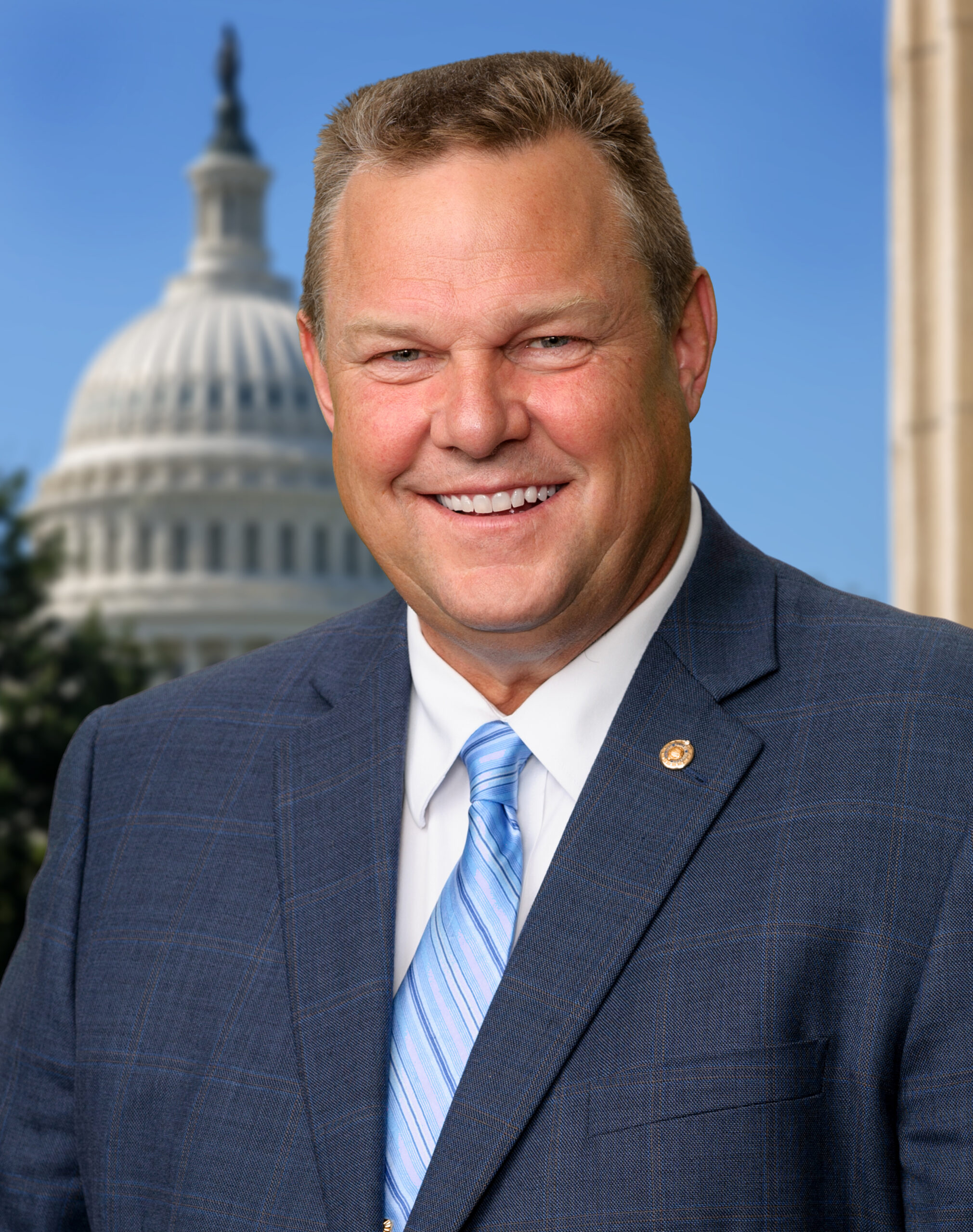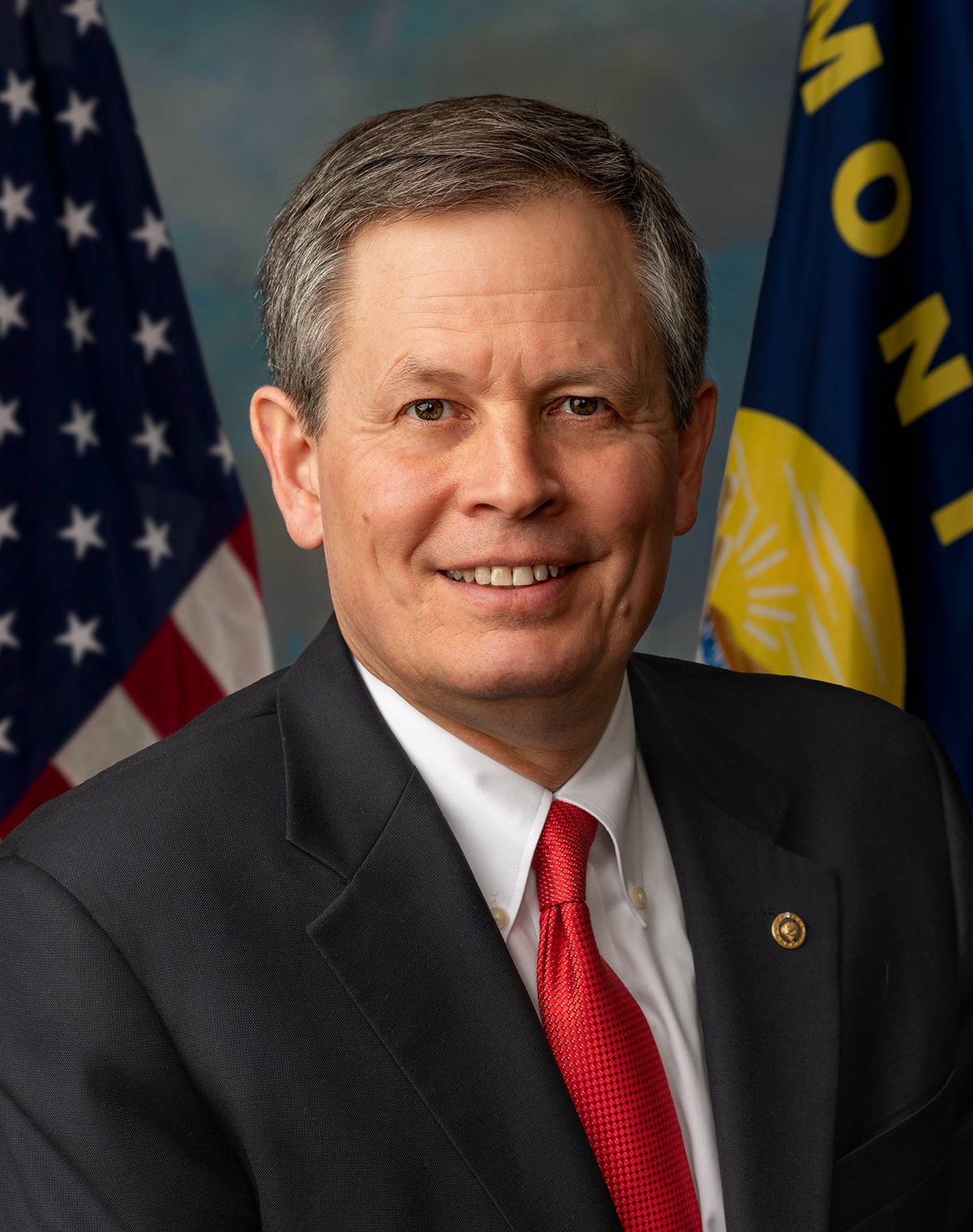Montana
State Senators:
Jon Tester (D)

Term Start: January 3, 2007
Full Name: Raymond Jon Tester
Date of Birth: August 21, 1956
Birthplace: Havre, Montana, U.S.
Early Life and Education: Jon Tester was born in Havre, Montana, and raised in the small town of Big Sandy, where his family farmed. Tester attended Big Sandy High School and later earned a Bachelor of Science degree in Music from the University of Providence (formerly the College of Great Falls) in 1978. He returned to work on his family’s farm after graduation, continuing the agricultural traditions of his family
Personal Life: Jon Tester is married to Sharla Tester, and they have two children. The family resides in Big Sandy, Montana, where they continue to run their organic farm. Tester is known for his straightforward style and deep commitment to his constituents, often emphasizing his roots as a farmer and his dedication to serving Montana.
Early Career: Before entering politics, Tester worked as a farmer and music teacher. He ran his family’s farm, which he continues to operate today, producing organic crops such as wheat, barley, and peas. His background in agriculture and education shaped his perspectives and policy priorities.
Political Career:
- Montana State Senate: Elected in 1998, served until 2007. Held positions including minority whip, minority leader, and president of the Montana Senate (2005 – 2007). He focused on issues such as education, healthcare, and economic development, earning a reputation as a pragmatic and effective legislator.
- U.S. Senate: In 2006, Tester ran for the U.S. Senate and defeated incumbent Republican Senator Conrad Burns. He took office on January 3, 2007, and has been re-elected twice, most recently in 2018. As a senator, Tester has focused on issues including veterans’ affairs, healthcare, agriculture, and government accountability. He is known for his bipartisan approach and willingness to work across party lines to achieve legislative goals
Committees:
- Committee on Appropriations
- Committee on Banking, Housing, and Urban Affairs
- Committee on Commerce, Science, and Transportation
- Committee on Indian Affairs
- Committee on Veterans’ Affairs (Chairman)
Legislative Achievements:
- Veterans’ Affairs: Advocates for improved veterans’ healthcare and benefits. Worked on the VA MISSION Act, which aims to expand healthcare options for veterans.
- Agriculture: Supports sustainable farming practices and has worked on several Farm Bills to aid farmers and rural communities. Strong proponent of organic and sustainable agriculture.
- Defense and National Security: Focuses on defense spending and cybersecurity measures, ensuring robust funding for military readiness.
- Healthcare: Supports the Affordable Care Act (ACA) and has worked on legislation to reduce prescription drug prices and improve rural healthcare access.
- Infrastructure: Advocates for infrastructure development in rural areas, including broadband expansion and transportation improvements.
Senator Tester is known for his pragmatic and bipartisan approach to legislation. His focus areas include veterans’ affairs, agriculture, defense, healthcare, and infrastructure development. Tester’s background as a farmer and educator informs his legislative priorities and commitment to his constituents in Montana.
Committees
Appropriations: Committee members manage and oversee federal budget to ensure government funds are allocated and spent properly.
Banking, Housing, and Urban Development: Committee ensures that the banking system is safe, housing is accessible, urban areas are well-developed, and consumers are protected in financial matters.
Commerce, Science, and Transportation: Committee plays a vital role in shaping policies that impact economic development, technological innovation, transportation systems, and scientific advancements within a country or region.
Indian Affairs: Committee conducts hearings, investigations, and studies to address these issues and to develop and recommend legislation to the Senate that impacts Native American communities.
Veterans’ Affairs: Oversees veterans’ benefits, medical care, and assistance in transitioning to civilian life.
Voting patterns
Senator Tester has a voting record that aligns with his focus on supporting veterans, healthcare, environmental protection, and economic policies.
Key Voting Patterns:
Healthcare and Reproductive Rights: Tester has consistently supported expanding healthcare access and protecting reproductive rights. He co-sponsored and voted for the “Right to Contraception Act” (S.4381) and the “Right to IVF Act” (S.4445), showing his commitment to ensuring nationwide access to these healthcare services.
Environmental Issues: Tester has a strong record on environmental protection, earning high scores from environmental groups like the League of Conservation Voters. He supports legislation aimed at addressing climate change and promoting renewable energy. He has opposed efforts to weaken environmental regulations, such as voting against bills that would undermine the Clean Water Act and other key environmental protections.
Economic and Fiscal Policies: Tester has backed various economic relief measures, including those related to the COVID-19 pandemic, to support individuals and businesses. He has supported appropriations bills to fund critical government operations and infrastructure projects, reflecting his commitment to economic development and fiscal responsibility.
National Security and Defense: Tester supports robust national security measures. He voted for the “National Defense Authorization Act” to ensure adequate funding for the military and intelligence agencies, emphasizing the importance of national defense and security.
Labor and Employment: Tester has supported labor rights and fair employment practices. He has voted for measures that protect workers’ rights and oppose efforts to diminish labor protections, such as voting against resolutions that would weaken the National Labor Relations Board’s rules.
Senator Jon Tester’s voting record demonstrates his commitment to progressive policies across various domains, including economic development, healthcare reform, national security, environmental protection, and social justice. His legislative efforts focus on supporting working families, ensuring accessible healthcare, protecting the environment, and promoting equality and civil rights.
Full Name: Steven David Daines
Date of Birth: August 20, 1962
Birthplace: Van Nuys, California, U.S.
Early Life and Education: Steve Daines was born in Van Nuys, California, but moved to Bozeman, Montana, with his family when he was two years old. He graduated from Bozeman High School and went on to attend Montana State University, where he earned a Bachelor of Science degree in Chemical Engineering in 1984. Daines was actively involved in student leadership during his college years.
Personal Life: Steve Daines is married to Cindy Daines, and they have four children. The family resides in Bozeman, Montana. Daines is known for his commitment to public service and his efforts to represent the interests of Montanans through his work in the Senate.
Early Career: After graduating from college, Daines began his career as a manager with Procter & Gamble, where he spent 13 years working in the United States and abroad, including six years in China where he helped launch American brands. In 1997, he returned to Montana to join his family’s construction business. Later, he became an executive at RightNow Technologies, a cloud-based customer service software company, which was headquartered in Bozeman.
Business Achievements: Played a key role in the rapid growth of RightNow Technologies, which became a publicly traded company and was later acquired by Oracle.
Steve Daines (R)

Term Start: January 3, 2015
Political Career:
- U.S. House of Representatives: In 2012, Daines was elected to the U.S. House of Representatives for Montana’s at-large congressional district. He served from 2013 to 2015. During his tenure in the House, he focused on issues such as job creation, energy development, and reducing federal regulations.
- U.S. Senate: In 2014, Daines ran for the U.S. Senate and won, succeeding retiring Senator Max Baucus. He took office on January 3, 2015. As a senator, Daines has continued to focus on issues important to Montana, including energy policy, public lands, and veterans’ affairs. He was re-elected in 2020.
Committee Assignments:
- Committee on Banking, Housing, and Urban Affairs
- Committee on Energy and Natural Resources
- Committee on Finance
- Committee on Indian Affairs
Legislative Achievements:
- Energy and Environment: Advocates for responsible development of energy resources and significant forest management reforms. Sponsored the most significant public lands bill for Montana in over 30 years.
- Healthcare: Supports market-based healthcare reforms and has voted against the Affordable Care Act. Emphasizes reducing prescription drug prices and increasing competition in the healthcare market.
- Economic Development: Focuses on job creation and economic growth through tax cuts and deregulation. Supports policies that benefit small businesses and foster a favorable business environment.
- National Security: Strong proponent of national defense and cybersecurity measures. Consistently votes for the National Defense Authorization Acts (NDAA) to ensure robust funding for the military.
Senator Daines is known for his commitment to conservative values and policies that support economic growth, energy independence, and national security. His background in business and technology informs his legislative priorities, focusing on job creation, healthcare reform, and responsible resource management.
Committees
Banking, Housing, and Urban Development: Committee ensures that the banking system is safe, housing is accessible, urban areas are well-developed, and consumers are protected in financial matters.
Energy and Natural Resources: Committee plays a role in shaping national policies related to energy security, environmental protection, and the sustainable management of natural resources.
Finance: Committee plays a crucial role in shaping the economic direction of a country or region by influencing fiscal and monetary policies that impact individuals, businesses, and governments.
Indian Affairs: Committee conducts hearings, investigations, and studies to address these issues and to develop and recommend legislation to the Senate that impacts Native American communities.
Voting patterns
Senator Daines has a voting record that aligns with his conservative values, particularly in the areas of national security, economic policy, environmental regulation, and healthcare.
Key Voting Patterns:
National Security and Defense: Daines consistently supports strong national security measures. He voted in favor of the “National Defense Authorization Act for Fiscal Year 2024” (H.R. 2670), ensuring robust funding for the Department of Defense and related activities.
Healthcare and Reproductive Rights: Daines has opposed measures aimed at expanding reproductive rights. He voted against the “Right to Contraception Act” (S.4381) and the “Right to IVF Act” (S.4445), reflecting his conservative stance on these issues.
Economic and Fiscal Policies: Daines supports reducing regulatory burdens on businesses. He voted for resolutions disapproving certain rules from the Securities and Exchange Commission and the Department of the Treasury, indicating his preference for less federal oversight of the financial sector.
Environmental Issues: Daines has a low score from environmental groups due to his opposition to stringent environmental regulations. He voted for bills that disapprove of certain EPA rules, such as those blocking energy conservation standards for consumer furnaces (S.J.Res.58) and other measures aimed at reducing federal environmental regulations.
Labor and Employment: Daines has supported legislation limiting the power of labor unions and reducing regulatory burdens on employers. He voted for H.J.Res.98, which disapproved a rule by the National Labor Relations Board regarding joint employer status.
Senator Daines’ voting record reflects his commitment to conservative principles, emphasizing fiscal responsibility, limited government intervention in healthcare, a strong national defense, and traditional social values. His stance on environmental issues prioritizes economic growth and energy independence.
